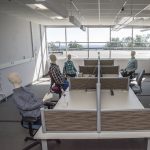Welcome to Monitor Notes, a weekly roundup of news items, event announcements, and updates on past Bay Area Monitor articles.
Equity Stake in Housing
 Affordable housing and equity presented public policy challenges long before the pandemic. To exchange new ideas about these and other pressing issues, MTC and ABAG are launching a series of public forums. The first Bay Area Metro Talks Equity Series will be held online this morning at 10, with the video recording shared later for those unable to watch live. The discussion will be moderated by MTC Executive Director Therese McMillan (pictured), who will be joined by speakers from the media, local government, and a community group for an hour-long session on the housing affordability crisis. Future forums will cover community development, climate change, economy, technology, and transportation. Overall, the series will “consider how we go about rebuilding a better Bay Area in the wake of the COVID-19 health and economic crisis, lifting up equity as the core value that illuminates our shared goals as we consider how best to restore our region,” according to event details. Read the Monitor for a refresher on recent MTC housing policy reform work.
Affordable housing and equity presented public policy challenges long before the pandemic. To exchange new ideas about these and other pressing issues, MTC and ABAG are launching a series of public forums. The first Bay Area Metro Talks Equity Series will be held online this morning at 10, with the video recording shared later for those unable to watch live. The discussion will be moderated by MTC Executive Director Therese McMillan (pictured), who will be joined by speakers from the media, local government, and a community group for an hour-long session on the housing affordability crisis. Future forums will cover community development, climate change, economy, technology, and transportation. Overall, the series will “consider how we go about rebuilding a better Bay Area in the wake of the COVID-19 health and economic crisis, lifting up equity as the core value that illuminates our shared goals as we consider how best to restore our region,” according to event details. Read the Monitor for a refresher on recent MTC housing policy reform work.
Splash of Water

The Brookings Institution and Stanford University water experts are participating in a June 9 “COVID-19 and Water” Twitter chat from 10 to 11 a.m. Newsha Ajami (pictured), senior research engineer at the Stanford Woods Institute for the Environment, and Joe Kane, fellow with the metropolitan policy program at the Brookings Institution, will spill thoughts about the role of water as it relates to issues such as disease transmission and detection, infrastructure, and utilities. Join the discussion on Twitter by following @StanfordWoods and using #COVIDWater to engage in the conversation.
Calculating the Risk

As some retail and small businesses resume work in indoor spaces, what’s the risk of airborne virus transmission? A research team at the Lawrence Berkeley National Laboratory has launched a study to answer this key question. Most of us understand by now that when an infected person emits respiratory aerosols via cough, sneeze, talking, or breathing, some falls to the ground or other surfaces. But an “unknown portion” also gets mixed into the air in the room and eventually other rooms in a building. This potential transmission route is the focus of the team’s research in which they’ll employ a building simulator and testbed to mimic various office and school heating, ventilation, and air conditioning configurations. Their aim is to share recommendations related to ventilation design, occupancy, and occupant behavior with public health agencies.
The Lion’s Share

A big part of enjoying local open spaces is understanding and respecting the needs of animals. Consider mountain lions that call the Santa Cruz Mountains home. They often face challenges that make it difficult to move safely and access resources they need, circumstances the Monitor‘s Aleta George explained in a recent article. To help locals learn more about this animal’s instinct, the Midpeninsula Regional Open Space District recently hosted a mountain lion webinar that’s available for replay. Midpen, which is developing wildlife and regional trail crossings along Highway 17, discussed during the presentation mountain lion biology and habitat. For another perspective, UC Davis’ Road Ecology Center is hosting a June 10 webinar about its research and efforts to design crossings that meet wildlife’s behavioral needs.
Monitor Notes is produced by Cecily O’Connor. To receive it by email, scroll to the bottom of this page, enter your email address in the box under “RECEIVE EMAIL UPDATES,” and click the red “SIGN UP” button.